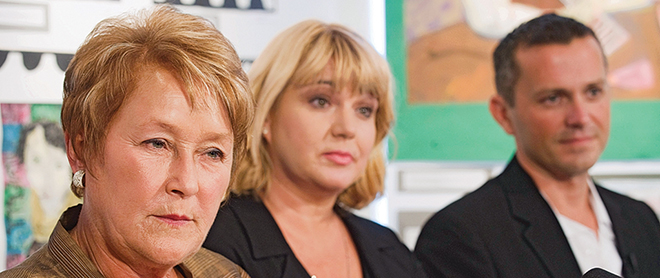The PQ on the right and the wrong kind of Quebecers
Paul Wells on the fundamental changes in the party’s language and identity policies
Graham Hughes/CP
Share

“Je n’ai jamais lu autant de violence envers nous les Québécois dans la Gazette, j’ai refusé de donner une entrevue à ce journal,” Sophie Stanké wrote on Twitter a few days after the Quebec election. Translation: “I’ve never read so much violence toward us, the Quebecers, in the Gazette, I refused to give this newspaper an interview.”
Stanké, an actress and TV personality, was the Parti Québécois candidate in Saint-Henri-Saint-Anne, one of the prettiest ridings in Montreal. She lost. The Gazette is still publishing.
I wonder who Stanké thinks is working at the Gazette. The paper has been published in Montreal since 1778. The very large majority of its employees grew up in Quebec. I will guarantee that if Sophie Stanké and Don Macpherson, the paper’s Quebec affairs columnist, sat down for a written and oral exam in French, Macpherson would get higher marks. And yet here was a candidate for public office drawing a casual distinction between “la Gazette” and “nous les Québécois.”
Nor was Stanké alone. Stanké didn’t make it to the national assembly, but enough of her PQ colleagues got elected to form a minority PQ government. And they are all in the business of drawing distinctions between the right and wrong kind of Quebecers.
The PQ gets angry when my colleagues call this xenophobia. Fine. Call it Happy Fun Politics if you prefer. But it represents a fundamental change in the party’s policies on language and identity. It identifies bilingual non-francophones— people whose first language is not French but who can converse easily in French—as a problem. And it seeks to make Montreal a less welcoming home for them.
I don’t know anyone who doesn’t condemn the despicable election-night shootings, an apparent attempt on Pauline Marois’s life by a gunman who shouted “the anglophones are awakening” as police dragged him off. I wish the cloud he stirred up were not hanging over Quebec politics now. But even if that incident had never happened, I can’t imagine much except bitterness in Quebec’s language politics for the next few years.
René Lévesque’s first PQ government passed Bill 101 in 1977. It sought to make French the common language in Quebec—the language you speak to strangers, whatever you speak at home. Its preamble was quite clear. It said the national assembly wanted to “make French the language of government and the law, as well as the normal and everyday language of work, instruction, communication, commerce and business.” And it said the law would be “respectful of the institutions of the English-speaking community of Quebec, and respectful of the ethnic minorities, whose valuable contribution to the development of Quebec it readily acknowledges.”
Of course the rest of the law was a long list of restrictions on the use of the English language. Thousands of anglophones left Quebec. But hundreds of thousands stayed and raised their children in two languages. Hundreds of thousands of immigrants have arrived and raised their children under Bill 101’s rules.
And now the PQ wants to change the rules. “While we must celebrate the progress of French as a second language in Montreal,” a PQ press release during the election campaign said, “the decline of the proportion of Montrealers for whom French is the main spoken language is preoccupying.”
Jean-François Lisée, a former journalist who advised Marois and will now sit as a member of her government, likes to draw a distinction between French as a “common language” and French as a “language of use.” For 40 years the test was: do you greet a stranger in public in French? Now it’s: which language do you speak at home?
“There is obviously no question of interfering in the language used by citizens in their private life or to make them change,” the PQ news release said. Instead, the PQ will stop speakers of weird languages before they get to Quebec. Lisée likes to say that a person from Shanghai who speaks French should take a back seat in the immigration queue to a person from Bordeaux, because the person from Bordeaux will speak French at home.
Now, imagine you spent 35 years playing by Bill 101 rules. Say you’re a guy like Don Macpherson, the Gazette columnist. He speaks French as easily as Pauline Marois does. He was the first reporter René Lévesque spoke to after Lévesque won the 1976 election. (Times have changed: Marois refused all interviews with English-language outlets before and since the election.)
In April, Macpherson began writing a series of uncharacteristically angry columns about the eroding political position of anglophones in Montreal. “We find ourselves once again under sustained public attack,” he wrote, “as we had not been since the controversy over the language of commercial signs in the late 1980s.”
The game has changed. “We realize it’s a game we can’t win without abandoning our own language, culture and identity,” Macpherson wrote. “And we’re tired of playing it for the amusement of those for whom we will always be not an asset but a problem for Quebec.”
Why did the PQ change its policies? Because it ran as a cosmopolitan party advocating “civic nationalism” in 2007 and suffered its worst defeat ever. Appealing to identity politics puts a floor under its support. But now the party is in a fix. If Marois’s minority government fails to implement its new restrictions on English, its base will abandon her and radicalize further. If it succeeds, a large part of the Bill 101 generation will give up on Quebec. In the meantime, there’s no way this debate can be calm and serene.